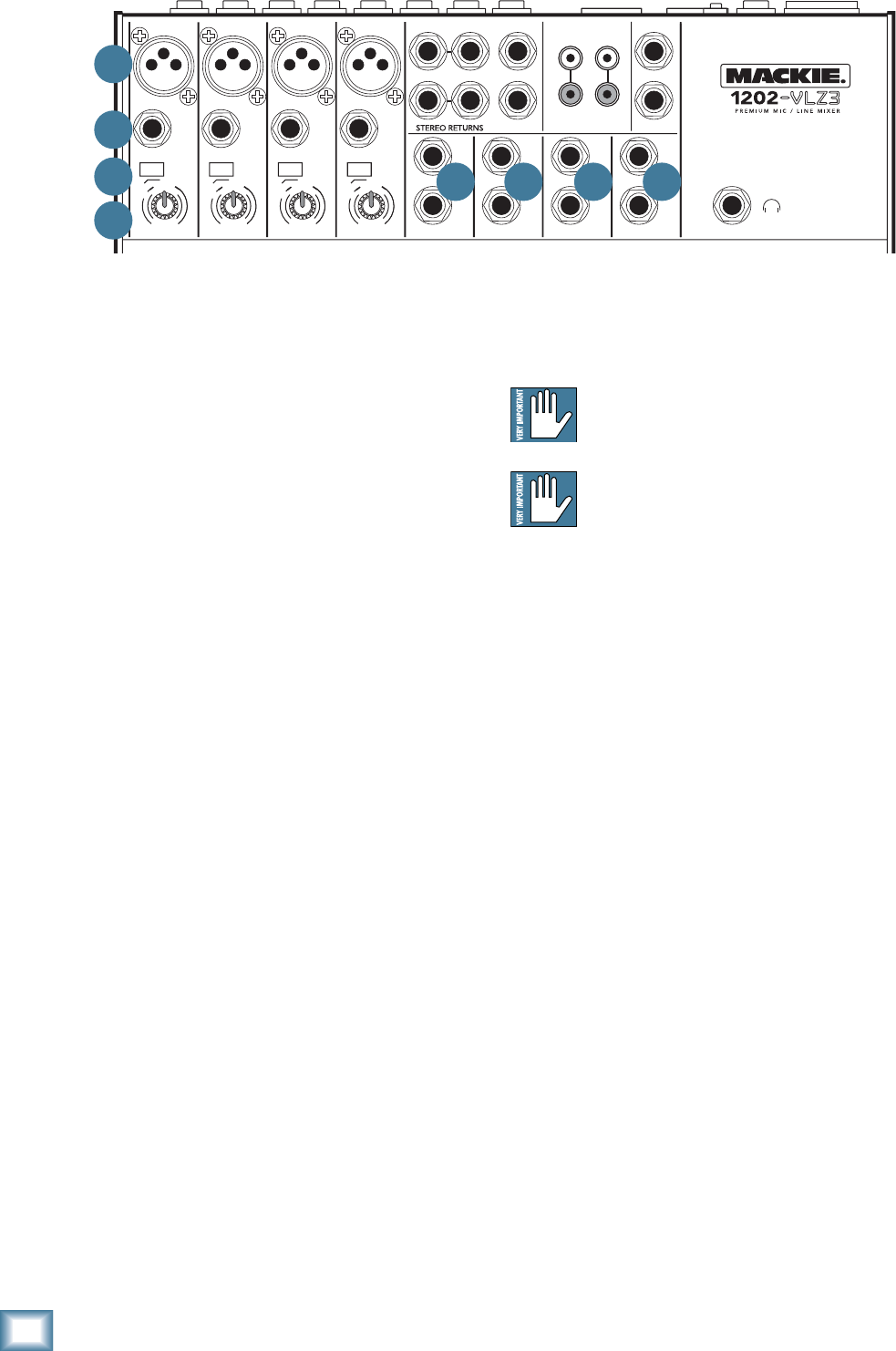
8
1202-VLZ3
1202-VLZ3
Patchbay Description
At the risk of stating the obvious, this is where you
plug everything in: microphones, line-level instruments
and effects, headphones, and the ultimate destination
for your sound: a tape recorder, PA system, etc.
See Appendix B for further details and drawings of
the connectors you can use with the 1202-VLZ3. Also see
the Channel Strip description on page 13 for details of
the signal routing from the XLR and Line inputs.
1. MIC INPUTS (Channels 1–4)
We use phantom-powered, balanced microphone
inputs just like the big studio mega-consoles, for exactly
the same reason: This kind of circuit is excellent at re-
jecting hum and noise. You can plug in almost any kind
of mic that has a standard XLR male mic connector.
Professional ribbon, dynamic, and condenser mics
will all sound excellent through these inputs. The
1202-VLZ3’s mic inputs will handle any kind of mic level
you can toss at them, without overloading. Be sure to
perform the Level-Setting Procedure on page 3.
Not every instrument is made to connect directly to a
mixer. Guitars commonly need a Direct Injection (DI)
box to connect to the mixer's MIC inputs. These boxes
convert unbalanced line-level signals from your guitar,
into balanced mic-level outputs, and provide signal and
impedance matching. They also let you send your gifted
guitar renditions over long cables or audio snakes, with
minimum interference and high-frequency signal loss.
Ask your dealer or guitar maker about their recommen-
dations for a good DI box.
PHANTOM POWER
Most modern professional condenser mics are
equipped for phantom power, which lets the mixer
send low-current DC voltage to the mic’s electronics
through the same wires that carry audio. (Semi-pro
condenser mics often have batteries to accomplish the
same thing.) “Phantom” owes its name to an ability to
be “unseen” by dynamic mics (Shure SM57/SM58, for
instance), which don’t need external power and aren’t
affected by it anyway.
The 1202-VLZ3’s phantom power is globally controlled
by the PHANTOM [22] switch on the rear panel. (This
means the phantom power for channels 1-4 is turned on
and off together.)
Never plug single-ended (unbalanced)
micro phones or instruments into the MIC [1]
input jacks if the phantom power is on.
Do not plug instrument outputs into the
MIC input jacks with phantom power on,
unless you know for certain it is safe to do so.
2. LINE INPUTS (Channels 1–4)
These four line-inputs share circuitry (but not phan-
tom power) with the mic preamps, and can be driven
by balanced or unbalanced sources at almost any level.
You can use these inputs for virtually any signal you’ll
come across, from instrument levels as low as –40 dB to
operating levels of –10 dBV to +4 dBu, since there is 40
dB more gain available than on channels 5–12.
To connect balanced lines to these inputs, use a 1⁄4"
Tip-Ring-Sleeve (TRS) plug, the type found on stereo
headphones.
To connect unbalanced lines to these inputs, use a
1⁄4" mono (TS) phone plug or standard instrument
cable.
The LINE IN inputs 1–4 are a good place to connect
older instruments that need more gain. You can correct
weak levels by adjusting the corresponding channel’s
GAIN control.
CAUTION
-
1
0
d
B
V
GAIN
+15dB-45dB
M
I
C
G
A
I
N
0
U
60
LINE IN 1
MIC
1
LOW CUT
75 Hz
18dB/OCT
LOW CUT
75 Hz
18dB/OCT
LOW CUT
75 Hz
18dB/OCT
LOW CUT
75 Hz
18dB/OCT
BAL
OR
UNBAL
LINE IN 2
MIC
2
BAL
OR
UNBAL
LINE IN 3
MIC
3
BAL
OR
UNBAL
LINE IN 4
MIC
4
BAL
OR
UNBAL
AUX SEND
1
2
1
2
R
R
L
L /
MONO
ALL BAL/UNBAL
TAPE
INPUT
TAPE
OUTPUT
L
R
L
R
L
R
MAIN OUT
BAL/UNBAL
L
MONO MONO MONO MONO
LINE IN 5
–
6
R
LINE IN 7
–
8 LINE IN 9
–
10 LINE IN 11
–
12
BAL
OR
UNBAL
L
R
BAL
OR
UNBAL
L
R
BAL
OR
UNBAL
L
R
BAL
OR
UNBAL
X
D
R
M
I
C
P
R
E
X
D
R
M
I
C
P
R
E
X
D
R
M
I
C
P
R
E
X
D
R
M
I
C
P
R
E
GAIN
+15dB-45dB
M
I
C
G
A
I
N
0
U
60
-
1
0
d
B
V
GAIN
+15dB-45dB
M
I
C
G
A
I
N
0
U
60
-
1
0
d
B
V
GAIN
+15dB -45dB
M
I
C
G
A
I
N
0
U
60
-
1
0
d
B
V
ASSIGN
TO MAIN MIX
1
2
3
4
5 5 5 5


















